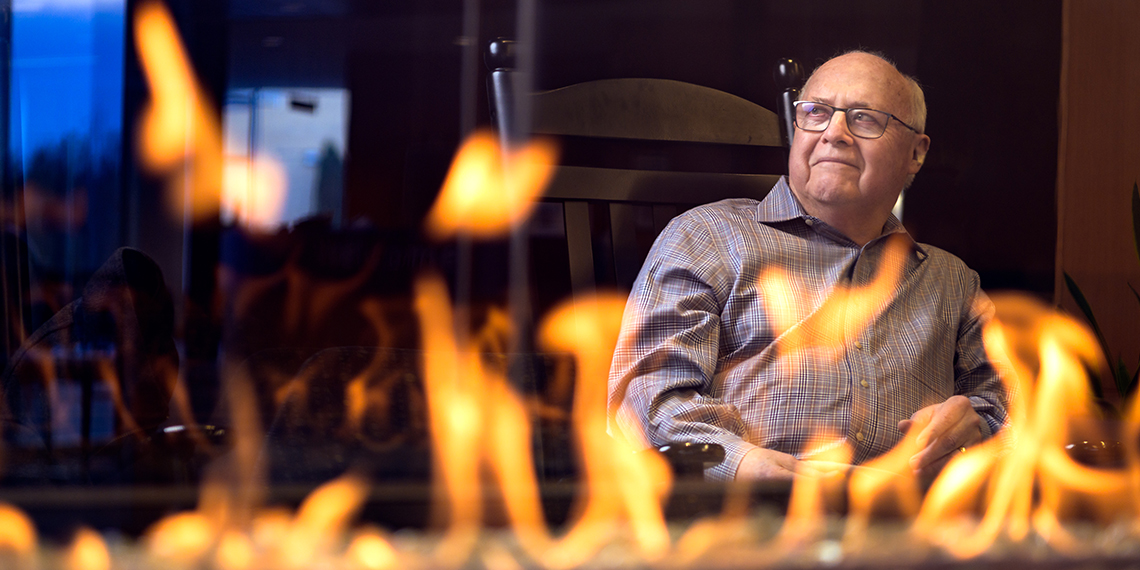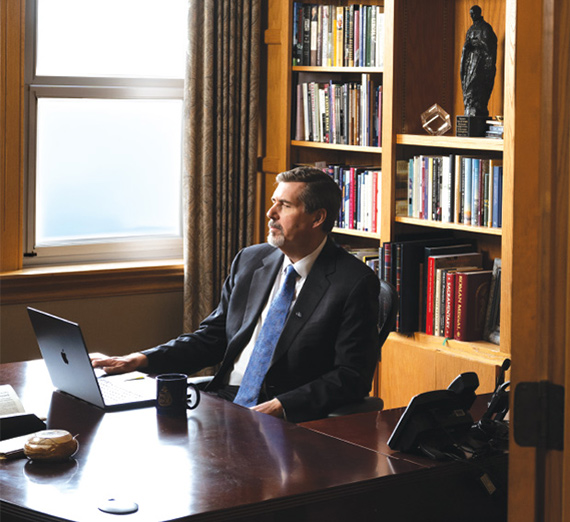Hired to Teach
Blaine Garvin retiring after 54 years of wisdom, service and Zag spirit

When Political Science Professor Blaine Garvin walks down the halls in College Hall he sees what he calls ghosts, or images representing Gonzaga greats who have blessed this institution over the 54 years Garvin has taught here.
“I remember who was here and all the amazing people I have known,” says Garvin, whose teaching career will end in May, not because he wants to retire. But his vision is poor and the health of his longtime wife Susan requires his care.
He used to start his day with a walk to Hemmingson and a four-shot espresso in the Hearth Lounge by the fireplace. A few tumbles recently have relegated him to morning coffee with his pals in Campus Printing downstairs in College Hall, who graciously have his coffee waiting for him daily.
The people he has known here over the years have bolstered this young Cal-Berkeley doctoral graduate from a quiet, perhaps skeptical soul when he arrived in 1971 to a champion of Gonzaga’s Jesuit values impacting the transformation of its students.
Most of his classes have focused on American politics and history of political thought. When he arrived, the Vietnam War was waging and Watergate had yet to happen. Students found their voices in activism.
Today, he says, his students are well-informed but baffled, as is he, by the polarization that perplexes this great country.
Liz Morris (’81), who met Garvin through her husband and former Garvin student and advisee Scott Morris (’81), calls Garvin “a gifted listener . . . and he loves and cares for people.
“Earlier in our lives we were facing a very difficult time,” Liz Morris says. “Blaine reached out to us, not to talk about our difficulty but just to sit with us. It was a very special time. Sometimes I think his gift of limited sight opens his mind and heart to things that many of us can’t see.”
Political Science Department Chair Joe Gardner says Garvin has mentored generations of faculty members, emphasizes civic participation in his classes “and educates students for lives of leadership and service for the common good,” a hallmark of a Gonzaga education.
Blaine’s broader commitment to Gonzaga included service on the Academic Council, as president of the Faculty Assembly, interim dean of the College of Arts and Sciences, University regent as elected by his faculty colleagues, director of the Honors Program and longtime member of the University Rank and Tenure Committee.
He is a master storyteller whose teaching style is both sophisticated and lucid, “building on his deep knowledge of the political world, integrating complex ideas into compelling stories, all in a way that is both clear and engaging to his students,” Gardner says.
Garvin welcomed Professor Stacy Taninchev to the department 17 years ago. She is now associate dean in Arts & Sciences. “I came from a research university (as Garvin had) and Blaine helped me to understand and adapt to the culture of teaching and advising at Gonzaga,” she says. “He helped me find the balance between holding students to high standards or responsibility on one hand but being understanding and accommodating on the other. He taught me to trust students when they say they are facing hard times, and I have carried that into my work.”
Garvin wants to bring out the best in his students and is devoted to knowledge acquisition, much like the lead character in “Mr. Holland’s Opus.” In fact, Garvin resembles the diminutive but enthusiastic teacher played by Richard Dreyfus, both in passion and in physical similarities.
In fact, when his son Sean was a tyke, Garvin took him to see “Close Encounters of the Third Kind,” also starring Dreyfus. Sean, sitting on Garvin’s lap, looked up at his dad and asked, “Is that you in the movie?”
Former Gonzaga President Father Bernard Coughlin, S.J., one of the “ghosts” Garvin sees walking college halls, arrived three years after Garvin.
He encountered the new president at a small gathering of faculty at Professor Tony Wadden’s house and said, “I’m still puzzled that a religious non-believer like me is teaching at Gonzaga and incorporating Saint Augustine into my classes. What am I doing here? Why does Gonzaga hire a person like me?”
Fr. Coughlin looked him straight in the eye and matter-of-factly responded, “We hired you to teach,” which gave Garvin some comfort.
“Years later I ran into Coughlin in the hall, he grabbed me by the back of the neck, as was common, and said, ‘You’ve been great.’” Garvin tears up just reciting that story. That reassurance, from one of his most respected mentors, meant the world to him.
Garvin reveals, “When a class goes really well, it’s an exhilarating experience. When it goes badly, it feels bad. Thank goodness I’ve had more good than bad.”
Garvin retires, by many accounts, as the longest-serving faculty member in university history, passing former English professor John Sisk last year.
He’s seen much change during that time.
At the turn of the century new President Father Robert Spitzer, S.J., and the Board of Trustees were engineering rapid growth, Garvin recalls. “I was concerned, but I was wrong about it. Gonzaga is more the place I came to now than it was for many years. President Thayne McCulloh reinforced our commitment to Jesuit values, which are as strong as they have ever been. Teaching and our community spirit are better. We live our values here. This is a remarkable place.”
Well stated by a remarkable professor, servant leader and true Zag. His College Hall ghostly image will be seen and revered for many decades to come.
- College of Arts & Sciences
- Political Science
- Spirit




